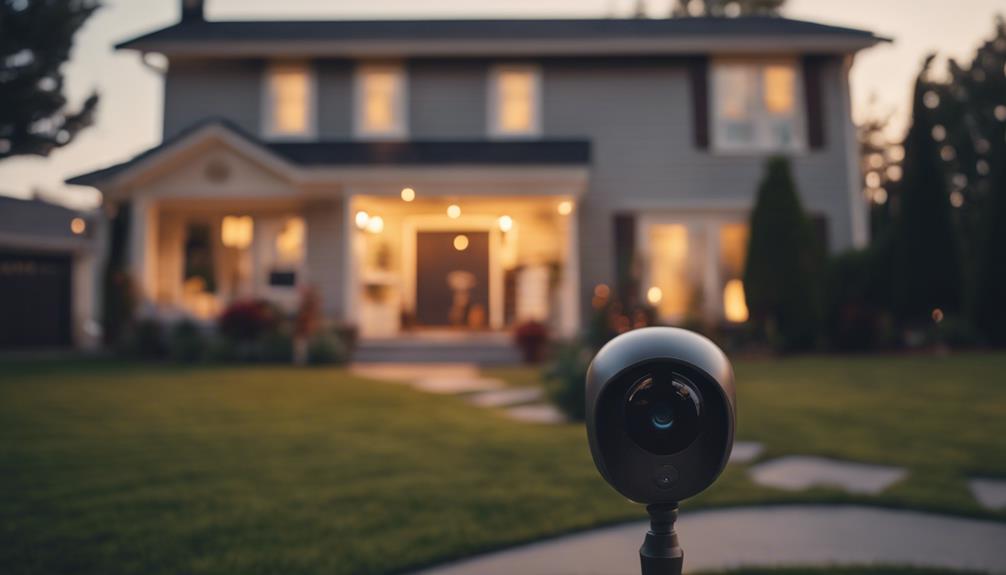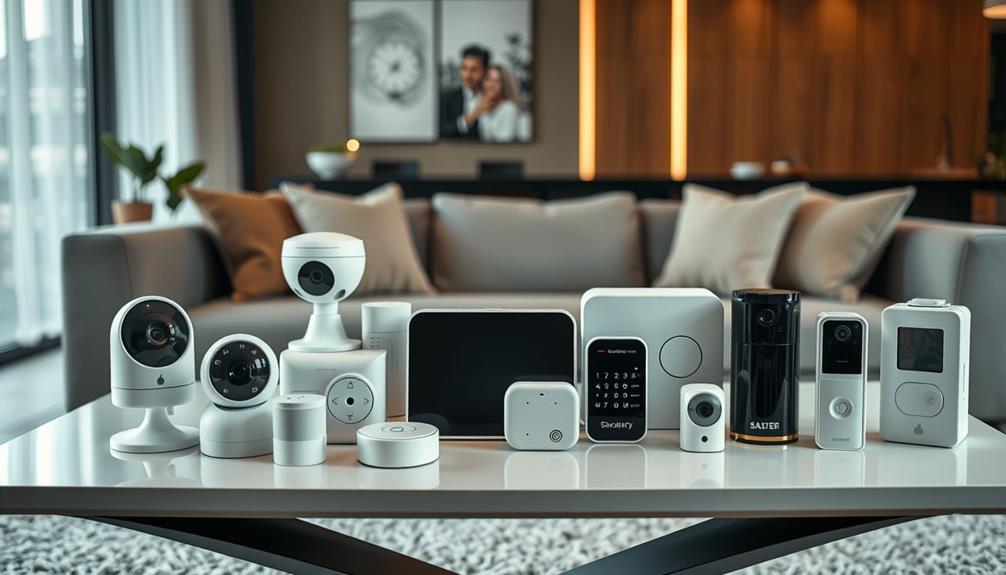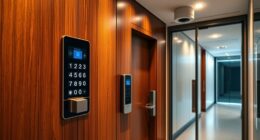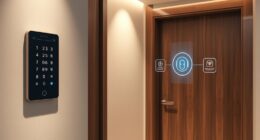Home security systems are electronic setups that help protect your home from unauthorized access, theft, and environmental hazards. They typically include entry sensors, motion detectors, surveillance cameras, and alarm systems that alert you and authorities during breaches. These systems can greatly deter crime, giving you peace of mind and allowing you to enjoy your space without worry. You can choose from DIY options or professional installations, depending on your needs. With the right system, you enhance your home’s safety and may even lower your insurance premiums. Discovering how they can work for you is just a step away.
Key Takeaways
- Home security systems protect residences from unauthorized access and theft through electronic setups.
- Core components include entry sensors, motion detectors, surveillance cameras, and alarm systems.
- Smart features enable remote access, monitoring, and integration with other devices for added convenience.
- They enhance safety, deter crime, and provide peace of mind for homeowners and their families.
Definition of Home Security Systems
A home security system is an electronic setup that protects your residence from unauthorized access, theft, and other threats. These systems utilize various components to create a thorough security network.
At the core are entry sensors placed on doors and windows, which detect any unauthorized openings. Motion detectors complement these by sensing movement within your property, while surveillance cameras provide visual monitoring, allowing you to keep an eye on your home from anywhere.
Many modern systems also integrate smart features, such as garage door openers, enhancing overall home security with remote access capabilities.
Alarm systems serve as a deterrent, alerting you and authorities in case of a breach. The control panel acts as the central hub, enabling you to manage all these components seamlessly.
With the rise of smart home security, you can enjoy remote access and receive real-time notifications through mobile apps, enhancing your ability to respond quickly to potential threats.
Additionally, many home security systems include environmental sensors, such as smoke and carbon monoxide detectors, ensuring your safety from hazards beyond break-ins.
Importance of Home Security

Home security is essential for protecting your home and loved ones.
Not only does a security system deter crime, but it also gives you peace of mind knowing you're safeguarded against potential threats.
Additionally, having a secure home allows you to enjoy your personal space, whether you're relaxing in a modern farmhouse bedroom or planning a getaway to island getaways.
Crime Deterrence Strategies
Investing in a security system can drastically reduce your chances of becoming a victim of burglary. Homes equipped with home security systems are statistically three times less likely to be targeted, highlighting their effectiveness in crime deterrence.
Furthermore, incorporating strategies from Master Your Survival Retreat Design Today can enhance your overall preparedness, including the security of your home. By incorporating visible security measures like security cameras and yard signs, you can deter up to 60% of potential burglars who often check for such features before deciding to break in.
A well-placed burglar alarm and motion sensors can further enhance your home's defenses, making intruders reconsider their plans at the sight of these deterrents. Research shows that 83% of burglars regularly assess for security systems, and many abandon their intentions upon encountering an active alarm.
In addition, professional monitoring services can respond to alerts within 30-45 seconds, greatly increasing the chances of apprehending intruders and minimizing property loss.
Peace of Mind
Feeling secure in your own space is essential, and a robust home security system can provide that invaluable peace of mind.
With the right security measures in place, you can greatly reduce the likelihood of becoming a target for burglars. Not only do these systems act as a deterrent, but they also bring emotional benefits, allowing you to enjoy your home without the constant worry of potential intrusions.
Additionally, just as you'd carefully select a home cleaning service based on reputation and reviews, it's important to choose a security system that fits your needs.
Home security systems offer smart features like real-time notifications and remote monitoring, keeping you connected and informed about your property at all times. This level of awareness enhances your sense of safety, knowing that you can respond quickly to any unusual activity.
Moreover, having a security system can lead to lower insurance premiums, as insurers recognize your reduced risk of theft and damage, contributing to your financial peace of mind.
Ultimately, investing in home security systems not only protects your belongings but also fosters a feeling of well-being. You can relax, knowing that your home is safeguarded, allowing you to focus on what truly matters—your family and your peace of mind.
Types of Home Security Systems

When it comes to securing your property, exploring the various types of home security systems can help you find the best fit for your needs and lifestyle. AI advancements in security technology have made systems more effective and user-friendly, enhancing the overall safety of homes. You've got several options to evaluate, each with its advantages.
- DIY Home Security Systems: These allow you to customize your setup and may offer optional professional monitoring for added flexibility.
- Professional Home Security: These systems require professional installation and often come with a monitoring center that provides thorough support and maintenance.
- Wireless Systems: Ideal for renters, these battery-operated systems are easy to install and use Wi-Fi or cellular backup for communication.
Each type caters to different preferences and lifestyles, so think about what works best for you. Whether you want the hands-on approach of DIY systems or the reliability of professional installation, there's a solution that fits your needs.
Additionally, understanding AI applications in various industries can inform your decisions on the latest security technologies.
Key Components of Security Systems

What makes a home security system effective are its key components, which work together to provide extensive protection for your property.
At the heart of these systems lies the central hub, or control panel, that communicates with various sensors, keeping you informed of potential threats.
Additionally, maintaining good indoor air quality is essential for a healthy living environment, as poor air quality can compromise your overall comfort and safety. For instance, using ozone air purifiers can help eliminate allergens and odors effectively, contributing to a safer home atmosphere.
You'll find common sensors like contact sensors that monitor doors and windows, motion sensors that detect movement using passive infrared technology, and glass-break sensors that enhance your security.
Security cameras, whether indoor, outdoor, or doorbell types, offer real-time video surveillance and can store footage locally or in the cloud for easy access.
When an unauthorized entry occurs, alarms sound alerts to notify you and can even alert authorities for a swift response.
Additionally, smart devices like locks and thermostats can seamlessly integrate into your home security systems, allowing for remote access and enhanced functionality through smart home technology.
These key components collectively create a robust defense for your home, ensuring you stay connected and protected, no matter where you are.
How Home Security Systems Work

Home security systems function by integrating a network of sensors and cameras that detect unauthorized entry and environmental threats, instantly alerting homeowners or monitoring services.
These systems utilize a central hub to communicate with various sensors, ensuring thorough coverage of your property. Effective communication, similar to the principles of professional email etiquette, is vital in keeping all components of the system synchronized for best performance.
When a sensor is triggered, you'll receive immediate alerts through mobile notifications or audible alarms. If you opt for professionally monitored systems, a monitoring center is notified for a swift response.
Here are some key features of home security systems:
- Sensors: Door/window contact sensors, motion detectors, and glass break sensors keep your home secure.
- Remote Access: Control your system from anywhere using mobile apps, giving you peace of mind.
- Motion Detection: Advanced AI technology enhances the accuracy of detecting movement, reducing false alarms.
Professional Monitoring Services

Professional monitoring services offer round-the-clock surveillance, ensuring a dedicated team is always ready to respond to alerts and emergencies. With 24/7 surveillance, these services can react to situations within 30-45 seconds, allowing for quick action when it matters most.
When an alert is triggered, the monitoring center verifies the situation before contacting emergency services, which helps reduce false alarms. Effective security measures can also provide emotional support and peace of mind, similar to the emotional support through heartfelt dementia poems and tattoos for families facing challenges.
Typically, you'll pay monthly fees for professional monitoring services, which range from $20 to $50 based on the level of service and features. Many plans include a safe word confirmation system, giving you peace of mind that alerts are handled accurately. This feature is particularly useful for preventing unnecessary emergency responses.
Additionally, homes equipped with professional monitoring may qualify for discounts on homeowners insurance. Insurance providers often recognize the enhanced security measures that come with these services, which can lead to savings on your policy.
Pros and Cons of Security Systems

Investing in a security system can greatly enhance your protection against intruders, but it's important to weigh the benefits against the costs. Here are some pros and cons to reflect on when deciding on home security systems:
- Pros:
- Enhanced protection: Homes with alarms are 300% less likely to experience burglary.
- Remote monitoring: Many systems allow you to monitor your home from anywhere using smart home devices.
- Homeowners insurance discounts: You may qualify for reduced premiums, helping offset costs.
- Cons:
- Installation cost: The average initial investment can be around $400, which might be significant for some homeowners.
You can choose between professionally installed systems or DIY options, depending on your comfort level and budget.
While the peace of mind that comes with home security systems is invaluable, it's important to evaluate how the installation costs, monthly fees, and potential discounts on homeowners insurance fit into your financial plans.
Cost Considerations and Savings

When considering a home security system, you'll want to factor in initial installation expenses and monthly monitoring fees.
Don't forget that investing in a system can also lead to potential discounts on your homeowners insurance.
Ultimately, understanding these costs can help you make an informed decision that balances security and savings.
Initial Installation Expenses
Initial installation expenses for home security systems can vary widely, typically averaging around $400, but DIY options can save you money with starter kits priced between $150 and $300. If you're considering a home security system, it's important to weigh your options carefully.
Here's what to keep in mind when evaluating initial installation costs:
- DIY Systems: These often allow you to set up your security without professional help, considerably lowering costs.
- Professionally Installed Systems: While these systems may require a larger investment, they often come with expert installation and setup.
- SimpliSafe System: Known for its budget-friendly options, SimpliSafe offers starter kits starting around $280, with flexible monitoring plans.
Monthly Monitoring Fees
Monthly monitoring fees for home security systems can range from $10 to $50, depending on the provider and the services you choose.
For instance, ADT charges around $44.99 per month for its top-tier professional monitoring plan, while competitors like Vivint and Frontpoint may reach about $50 per month.
If you're looking for budget-friendly monitoring, SimpliSafe offers plans starting at just $10 a month, making it an attractive option.
When evaluating your costs, remember to take into account the initial equipment investments, which typically average around $400.
These upfront costs combined with ongoing monitoring costs will affect your overall budget.
You might also want to factor in potential discounts on homeowners insurance, which could help offset some of those monthly monitoring fees.
Ultimately, the right choice for you depends on the level of security you need and how much you're willing to spend monthly.
Insurance Discounts Potential
Having a monitored home security system can lead to considerable savings on your homeowners insurance premiums, with discounts ranging from 5% to 20%.
Insurance providers recognize that security systems reduce the risk of theft and damage, making you a more attractive client. Depending on your provider and system, you could save between $200 and $500 annually.
Here are some factors that can influence your insurance discounts:
- Type of System: Advanced systems with features like motion sensors and security cameras often qualify for higher discounts.
- Professional Monitoring: Having a professional monitoring service can greatly enhance your safety and potentially lead to more substantial savings.
- Commitment to Safety: Maintaining a security system shows your insurer you're serious about risk management, which can yield further discounts.
Investing in monitored security systems not only safeguards your home but also helps you save on insurance premiums, making it a wise financial decision.
Frequently Asked Questions
What Is the Home Security System?
A home security system's designed to protect your residence from threats like burglary and environmental hazards. It includes sensors, cameras, and alarms, providing you peace of mind and enhancing your safety around the clock.
What Is Required for a Home Security System?
To set up a home security system, you'll need entry sensors, motion detectors, cameras, and alarms. Connect everything to a central hub, ensuring it operates wirelessly or through existing wiring for effective communication and monitoring.
What Is a Security System and How Does It Work?
A security system's designed to protect your home from threats. It works by using sensors and cameras to detect motion or unauthorized entry, sending alerts to you or monitoring centers for quick responses.
What Are the Benefits of a Home Security System?
A home security system offers you peace of mind, deters intruders, and can lower insurance premiums. With 24/7 monitoring and smart features, you stay connected and protected, ensuring your property's safety at all times.
How Can I Prevent False Alarms on My Home Security System?
To prevent causes of false alarms on your home security system, make sure all windows and doors are properly secured. Regularly check for low batteries in your sensors and keep them updated. Avoid placing objects near motion detectors that could trigger false alarms. Test your system regularly to ensure it’s functioning properly.
Conclusion
In today's world, having a home security system isn't just a luxury—it's a necessity.
You deserve peace of mind knowing your home is protected.
While some might think they can rely solely on locks and alarms, the reality is that modern systems offer advanced technology and professional monitoring that can deter threats effectively.
By investing in a security system, you're not just safeguarding your property; you're ensuring the safety of your loved ones and creating a secure haven.









